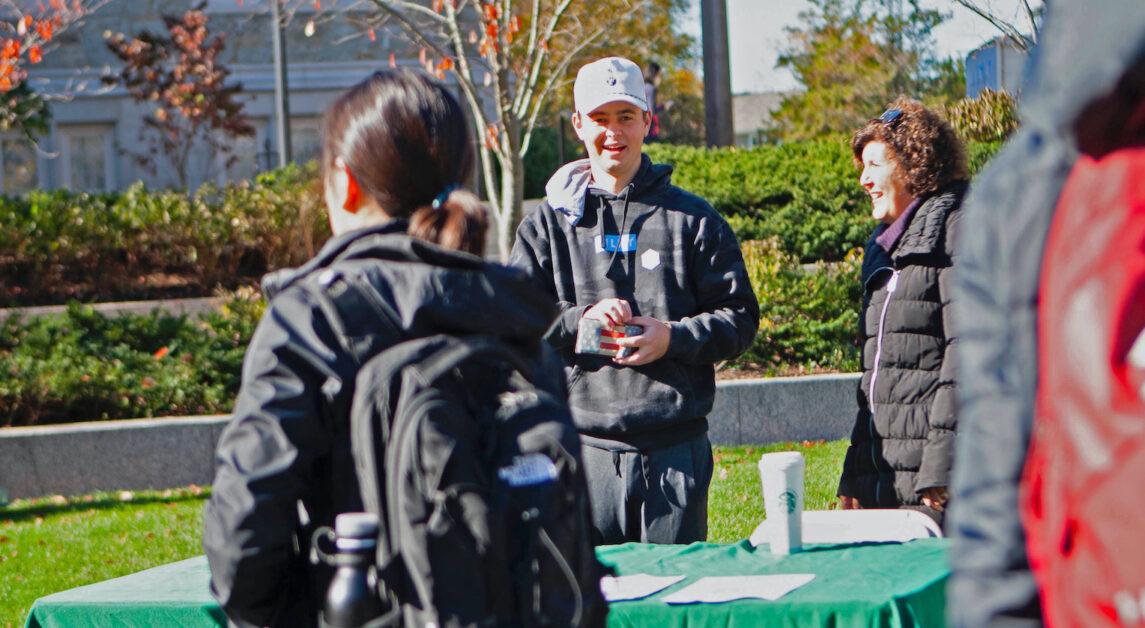About five years ago, UGBC President Jack Bracher joined the registry to become a potential stem cell donor. A few years later, Bracher found out that he had a match.
“I got a call from the nonprofit that I’d done it through saying that I was a match for a patient with leukemia, so I had started going through the process of being able to donate to him,” Bracher, MCAS ’22, said. “Fortunately he went into remission, so my donation wasn’t needed, but I wanted to find a way … to bring back the stem cell drive to Boston College’s campus and register more students to donate.”
The Undergraduate Government of Boston College (UGBC), Student Athlete Advisory Committee (SAAC), and Project Life Movement teamed up on Thursday and Friday to encourage students to join the global registry of potential bone marrow and stem cell donors.
Project Life Movement ambassador Luke Kuechly, former linebacker for the Carolina Panthers and BC ’11, returned to campus to encourage students to get swabbed.
The University last hosted a Project Life Movement bone marrow registration event when BC retired Kuechly’s jersey in 2016. Over 800 people joined the registry. This year, 777 people registered, according to Bracher, with 480 students getting swabbed on the first day. Bracher said this was the most swabs Project Life Movement got on a single day at a college campus.
Steve Luquire, a co-chair of Project Life Movement, said the number of students swabbed at BC exceeds what it defines as a good number for most colleges.
“On most college campuses where we go to do these drives, 200 is a good drive,” Luquire said. “We’re gonna be here today because of SAAC and the student government, and we’ve already done I think close to 250 in less than two hours.”
College campuses are the best place to find a healthy, diverse group willing to join the registry, according to Luquire.
“My wife of 41 years died of myelodysplasia syndrome,” Luquire said. “Her only match was her brother, who was 60 years old, and frankly, it works so much better if you have a person who is 18 to 35. And there’s no place better than a college campus to find people who are willing to look at the vision and mission and join us.”
Kuechly, who met Luquire in 2013, said they have been hosting drives together since then to raise awareness and improve the chances of finding donor matches.
“We just know this little bit of time that we spend today and tomorrow and having you guys come by, we can raise awareness to potentially have a match for somebody that needs it,” Kuechly said.
Finding even a few donor matches, Kuechly said, is a huge deal.
“You might have five to 500 to 1000 people here, but if you can get a couple donors that match, that’s what’s powerful,” Kuechly said.
Students joining the registry, Kuechly said, is a perfect example of BC students being men and women for others.
“The big pillar in the Jesuit community is how can you help other people by being selfless with your time, and this is a perfect example of it,” he said.
The impact of becoming a donor goes beyond just saving a person’s life, according to Ann Henegar, executive director of Project Life Movement.
“When you donate your stem cells or your bone marrow to a patient, you’re not only saving that person’s life, you’re affecting a community, you’re affecting a family, you know, a workplace, a campus,” Henegar said.
Henegar said she encourages people to think about the impact they can make by registering to be a donor.
“This is what I tell everybody … ‘If it were your sister, your boyfriend, your girlfriend, your aunt, your child, wouldn’t you want someone to say yes?’” she said.
For Lubens Benjamin, CSOM ’23, joining the registry is a great way of fulfilling BC’s mission.
“I think part of being someone who goes to BC is being a person for others and, like, this is right along with that mission,” Benjamin said. “If I could be a match for someone, if I can help someone extend their life, that’s just something great to be a part of and I don’t see why I’d say no to that.”
Jostine Rozenich, MCAS ’25, spoke to the importance of taking time out of the day to join the registry.
“It’s such a crucial and important thing, even if it only takes a few minutes and it can save lives,” Rozenich said. “I think that’s all about finding ways to put service into your daily life.”
Rozenich said she has family members who have needed various transplants that rely on others to donate, which has shaped her perspective on joining the registry.
“Why not go ahead and do that and save the life of somebody?” she said. “That is such a scary feeling to not know whether or not you’re going to get a match.”
Ultimately, it is a privilege to be part of a drive like this, Bracher said, and hosting the event just before the Red Bandanna Game—an annual football game that commemorates Welles Crowther, the BC alumnus credited with saving the lives of about a dozen people during the Sept. 11 terrorist attacks—is a great way of uniting the mission of Project Life Movement and Crowther’s story.
“I think it’s just a great privilege to be able to work with Project Life and Luke, as well as the Student Athlete Advisory Committee, who hosted the drive that I was a match for, and for all that to come full circle,” Bracher said. “And for us to of course be doing it on Red Bandanna weekend of all weekends means a lot.”
Featured Image by Ikram Ali / Heights Editor







